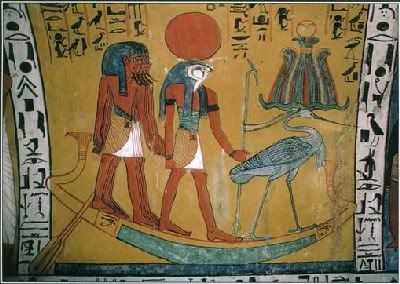Polemical Plagues?
Chapters 7-12 of Exodus contain one of the most well-known stories in the entire Old Testament. The Plagues brought upon Egypt illustrate God’s power over creation, and his love for Israel, among other things. There have been many attempts to explain why the plagues were what they were. Yahweh could have chosen to plague Egypt with nausea, drought, butterflies, or any other number of things, but he did not. He chose the following:
1. The Nile river was turned into blood. This caused the fish to die and eliminated much of the drinking water (Ex 7:14-25).
2. The plague of frogs (Ex 8:1-15).
3. The plague of lice (Heb. kinnim, also translated “gnats” or “mosquitoes”) (Ex 8:16-19).
4. The plague of flies (also translated “dog-fly”) (Ex 8:21-24 ).
5. The murrain (Ex 9:1-7). Much of the cattle and livestock (of the Egyptians only) were killed by terrible disease.
6. The plague, of "boils and blains" (Ex 9:8-12).
7. The plague of hail, with fire and thunder (Ex 9:13-33).
8. The plague of locusts, which covered the whole face of the earth, so that the land was darkened with them (Ex 10:12-15).
9. The plague of darkness (Ex 10:21-29) covered "all the land of Egypt" to such an extent that "they saw not one another." It only occurred where the Egyptians were.
10. The plague of the death of the firstborn of man and of beast (Ex 11:4,5; 12:29,30).
Many have attempted to give an explanation for why these plagues were chosen rather than any others. One such attempt is discussed in this paper: the plages were a polemic against the gods of Egypt.
The Position Presented
There is one clear passage giving the reason for the specific plagues, Numbers 33:4.
“. . . while the Egyptians were burying all their firstborn whom the Lord had struck down among them. The Lord had also executed judgments on their gods.”[i] This commentary on the story in question gives a different and enlightening perspective on the reason the plagues were given. In Exodus, it appears they are simply to persuade Pharaoh to let the people go (this is accomplished by sufficiently showing the supremacy of Yahweh to any other gods). However, we see more clearly the attack of Yahweh against the gods themselves as a reason for the plagues in Numbers.
There are many Egyptian gods that are well documented.[ii] Each town and city had a different (but very related) set than all the others. Some universal gods had (more or less) different traits in some cities than in others.[iii] It is therefore difficult to pinpoint what gods were attacked by what plagues. The following explanations take a generalized view of the gods they refer to.
The plague of blood could be seen as attacking Khnum, creator of water and life, or perhaps Hapi, the Nile god, or even Osiris (whose bloodstream was the Nile).[iv] The fact that fish are directly mentioned (Exodus 7:21) would also indicate that Ptah, the Memphis “Lord of Fish,” is being attacked in the first plague.[v] The Nile River itself was honored as a god. Egyptians would sing hymns and pray to it according to some of the papyri. Some suggest that Pharaoh’s visit to the River when Moses and Aaron encountered him was for this very reason.[vi] Yahweh’s perversion of these gods showed that he was more powerful then they. For if the Nile was not clean and healthy, the Egyptians would stop worshiping them. They therefore, would have stopped Yahweh if they could have. Obviously they could not.
The natural progression from the first plague would be to bring out something from the Nile river. The second plague does this with the frogs. Heket was the water goddess with a frog head. She was also the deity controlling birth and creation.[vii] Again, the Egyptians would grow to hate Heket (or Heqet) quickly if she could not control the frogs. A quick read over the beginning of Exodus 8 shows that she did not control them, but the God of Moses did.
After the plague of the frogs, Moses struck the ground with his staff, and the dust “became lice” (Exodus 8:16-17). Geb was the god of the ground to the Egyptians.[viii] This seems to be the god attacked by the fourth plague (flies) as well.[ix] Most gods had some sort of animal form. The plague of livestock pestilence could be directed at any number of gods. Two of the most popular were Hathor, the goddess of the sky and Apis, the fertility god. They took the form of a cow and a bull, respectively.[x] For the next plague, boils affected even the miracle workers who should have been able to be immune from such afflictions. Egypt, which was the most powerful nation on earth at the time, prided itself with its superior medical advances. Yet with all their knowledge, they could not cure the boils, only Yahweh could.[xi]
Hail was particularly rare in Egypt, so to have a terrible hail storm that destroyed crops was certainly supernatural. Yahweh could here be battling Seth, the god of the wind and storms, or Isis, the goddess of life who grinds, and spins flax and makes cloth.[xii] Along with the plague of hail, the locusts destroyed the Egyptian crops. Together, these plagues can be seen as attacking Min, the god of fertility and vegetation who was the protector of crops. Of the timing of the plagues, Zevit Ziony says, the “plagues came just before flax and barley were about to be harvested, but before the wheat and spelt had matured. A widely celebrated ‘coming out of Min’ was celebrated in Egypt at the beginning of the harvest. These plagues, in effect, devastated Min’s coming-out part.”[xiii]
The plague of darkness (ninth) is the worst so far with respect to the gods of Egypt. Ra the sun god was perhaps the strongest of all the gods and his worship reached across all Egypt. He is associated with creation of the world.[xiv] Others have suggested this plague could be against Aten, Atum, and Horus.[xv]
The last, and most dreadful, plague is generally seen as attacking the Pharaoh himself, who was certainly regarded as deity. He was the protector of the people, and the fact that he could not even save his own son, shows his vulnerability and weakness.[xvi]
Evaluation of the Position
This explanation of the reason for the specific plagues has not come without good criticism. There are so many gods in Egyptian culture that no matter what the plagues happened to be, one could find a god to match it. In fact, some of the plagues must be attributed to lesser known (shall we say obscure?) gods as it is (boils, lice, flies). Also, the gods attributed to the plagues are pulled from different time periods in Egyptian history. Some theologians fail to recognize that “Ancient Egypt” covers a vast amount of time and not all the gods were worshiped congruently. No evidence has risen that would point to the fact that all these gods were worshiped during the time of the Exodus; indeed, one would tend to think otherwise. There have been a variety of alternative views offered to explain the plagues’ significance.[xvii]
Conclusion
The plagues certainly point out the fact that Yahweh is much greater and more powerful than all the gods of Egypt (or really any other god, for that matter). It does not appear that the plagues should each be tied to a specific god (or even a few gods). Numbers 33:4, then, should be understood in a general sense, not a specific one. That is, the Biblical commentary on the plague narrative was meant to point out that Yahweh was over all the gods of Egypt. He was “taking them all on” in each of the plagues, and the stakes were raised with each one; He was not “picking them off” one at a time. As this story once again illustrates, we serve a great and mighty God, who is to be revered by all people everywhere. May it be on earth as it is in heaven.
[i].This and all other biblical quotations from NASB. © 1960, by the Lockman Foundation.
[ii].The works consulted for this paper on this topic were: Rosalie A. David, The Ancient Egyptians (London: Routledge and Kegan Paul, 1983). Henri Frankfort, Ancient Egyptian Religion (New York: Harper Torchbooks, 1948). Robert Kirk Kilpatrick, “Ancient Mythology Versus Eternal Reading: Judgements upon Egypt,” Turpin Library, Dallas Theological Seminary, Paper presented to Evangelical Theological Society, 1994. Dimitri Meeks and Christine Favard Meeks, Daily Life of the Egyptian Gods. trans. G. M. Goshgarian (London: Cornell University Press, 1996). Alexandre Moret, Kings and Gods of Egypt, (New York: G. P. Putnam’s Sons, 1912). Alan W. Shorter, The Egyptian Gods, (London: Kegan Paul, Trench, Trubner and Co., 1937).
[iii].Frankfort, Ancient Egyptian Religion, 24.
[iv].Ziony Zevit, “Three Ways to Look at the Ten Plagues,” Bible Review 6 , no. 3 (June 1990): 21.
[v].Kilpatrick, “Ancient Mythology,” 13.
[vi].F. B. Meyer, Exodus (Grand Rapids: Zondervan, 1952), 118.
[vii].Kilpatrick, “Ancient Mythology,” 14., Zevit, “Three Ways,” 21., and Shorter, Egyptian Gods, 131.
[viii].Kilpatrick, “Ancient Mythology,” 15.
[ix].Ibid., 16.
[x].Ziony, “Three Ways,” 21.
[xi].Kilpatrick, “Ancient Mythology,” 18.
[xii].Ziony, “Three Ways,” 21.
[xiii].Ibid., 21.
[xiv].Shorter, Egyptian Gods, 138., Meeks, Daily Life, vii., Ziony, “Three Ways,” 21.
[xv].Ziony, “Three Ways,” 21.
[xvi].Ibid., 21.
[xvii].Ibid., 21.


0 Comments:
Post a Comment
<< Home